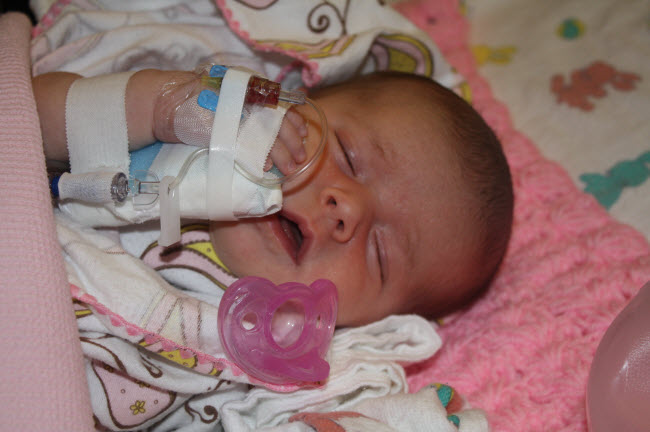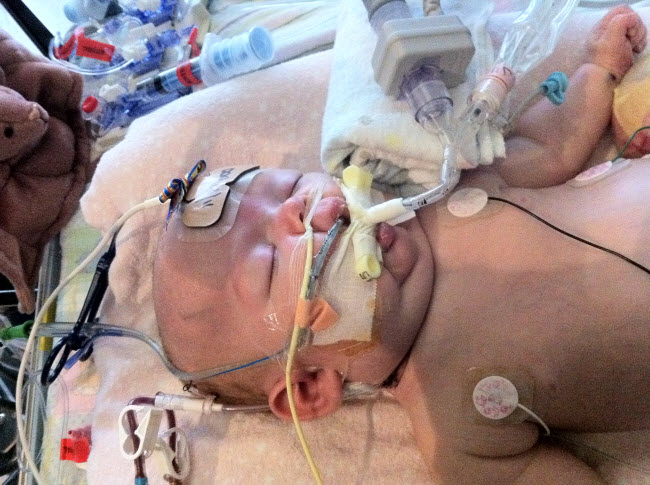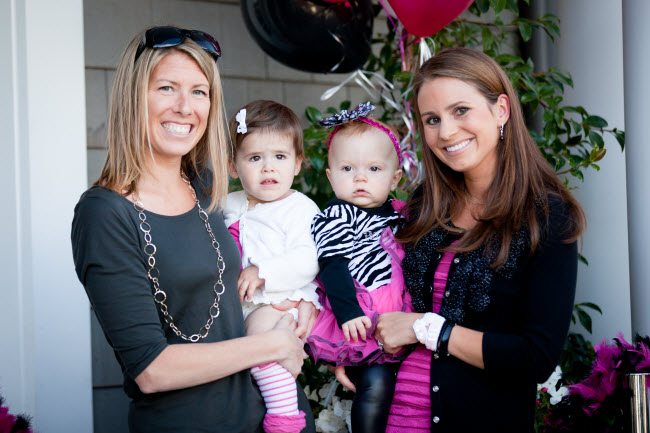Heidi Bruch of Seattle and Michelle Razore of Clyde Hill became friends in college. Though the two remained in touch following graduation, primarily through Facebook, they would never have imagined that what would reunite them years later would be the traumatic shared experience of almost losing a baby to illness — pertussis, more commonly known as whooping cough.
In light of the whooping cough epidemic in Washington State, we seized the opportunity to interview these local mothers about their heart-wrenching stories and their role as advocates speaking out about pertussis prevention, on behalf of the Sounds of Pertussis Campaign, a joint initiative of Sanofi Pasteur and March of Dimes.
Heidi, can you start by sharing the story of what happened to your daughter Caroline?
Heidi: I consider myself a very healthy, proactive mom, and I have had two totally healthy births. About a week or two before my daughter Caroline was due, in July of 2010, I developed a cough. It wasn't particularly bothersome; I didn't even have a cold, I just started coughing — I didn't really think much about it. And then Caroline was born a week later. We came home and were getting settled into our new life as a little family of four. About two weeks after we got home, Caroline started coughing. I didn't think by any means that her cough was related to mine, because a week prior my husband had encouraged me to go to the doctor to have my cough checked out and I had. The doctor checked out my lungs and dismissed the cough as seasonal allergies or asthma. He gave me an inhaler and sent me on my way.
When we took Caroline in for her two-week well baby checkup, I mentioned to the pediatrician that she was coughing and gagging, primarily around her feedings. They said that it sounded like reflux, which is common in newborns. We came home and a few days later at a family dinner, Caroline started having one of her coughing episodes while she was nursing. I sat her up and she turned completely blue. She looked like she was choking to death. I panicked. My sister-in-law was there, and she's an ER nurse at Seattle Children's. I said, "Do you see what I mean about this reflux? This is not right!" She told me the situation was critical and that we needed to go to the ER immediately. They admitted us to run some tests and it was discovered that she had pertussis. As soon as the infectious disease team came in for a consultation, they looked at me and said, "Who in your family has been ill or coughing?" My heart sank, as I realized I gave my baby a potentially fatal disease.
We spent the next month at Children's, with a full week in the ICU. Michelle will say the same thing: It is such a feeling of helplessness you experience. What affected me as a mild cough affects a newborn more than 20-fold. The worst part is that you can't really do anything once you have pertussis. They give you antibiotics just so that you're not contagious, but you have to just ride it out. We'd stand near Caroline when she would cough and couldn't catch her breath. It's absolutely heart-breaking.

We were considered lucky because our hospital stay was reasonably short, but I can tell you that month felt like a million years.
Like I said, I think of myself as a mother who is on top of my family's health, and we fully vaccinate — yet I was unaware that I needed this booster shot as an adult. When I came home, I started doing research. I felt like this had happened to us for a reason, and we were survivors. But I also had that guilt in the back of my head. Pertussis is so preventable — how can I talk about this? This feeling that I needed to do something intensified when I got a message from Michelle a couple of months later that Natalie was in the hospital with pertussis. How does this happen to two friends?
Your story suggests that whooping cough might be occasionally undetected or misdiagnosed in adults and babies.
Heidi: I think it is commonly misdiagnosed in adults as allergies or asthma, because it affects people so differently. For me, I coughed so hard that I cracked ribs, but many adults are never diagnosed with it at all because for them it's not that bad.
Michelle, will you share Natalie's story?
Michelle: Heidi and I were good college friends and roommates. We kind of fell out of touch, really only connected through Facebook. In July of 2010, Heidi posted pictures of Caroline. I was seven months pregnant at the time. Of course, it freaked me out, so I went to my doctor to get the Tdap booster. I talked to him about it, and he said not to worry, that my child was not going to get pertussis, that it was so rare. He said that I could get the booster when I was discharged from the hospital [following delivery]. So, I thought, okay, I'll do that. But, of course, once you have a baby, the last thing on your priority list is going to get a booster shot, so I never did go get it.
We had been home for two and a half weeks, when Natalie started having the same experience as Heidi shared about Caroline. We were thinking she had reflux, because she was coughing and spitting up after her feedings. We went to the doctor and they told us to get a special wedge for her to keep her upright. She got worse, so I took her to the doctor and they said it was a cold. The next day she was even worse — she was turning blue — so I took her back to the doctor and he checked her oxygen levels and told me we needed to go directly to Seattle Children's.
I knew the symptoms of pertussis, so I asked the doctors if that's what it could be. They said no, it didn't look like it could be pertussis, because she didn't have the standard "whoop" of the pertussis cough. I kept asking about it and they tested her. The results came back the next morning — positive for pertussis.
We spent two weeks in the NICU [Neonatal Intensive Care Unit], during which she was on high-flow oxygen and underwent breathing treatments. As Heidi said, there is nothing you can do — once the damage is done, it's done. Pertussis gets progressively worse and then reaches a plateau where you stay for a long time — and it is really bad — and then you start to get better. It was around Halloween that we thought Natalie had reached the place where she was starting to get better, but then she took a turn for the worse. The next night, they told us they needed to intubate her, put her on a ventilator. But that didn't work — her body started shutting down, nothing was working. So next they did two full-body blood transfusions with hand syringes. That wasn't working, so they called my husband and me aside and said that there was only one more thing they could try to help her survive: ECMO [extracorporeal membrane oxygenation]. They explained that it was essentially a heart and lung bypass machine; the machines would do all the work for her heart and lungs because they had completely given out. They put her on dialysis because her kidneys shut down as well. They handed us a paper to sign and advised us that this was a last-resort procedure and that our daughter was most likely not going to survive. We had to sign that piece of paper. It was our worst nightmare possible.
While on ECMO, Natalie developed a blood clot in her left leg and they thought they were going to have to amputate the leg — it turned completely black. Miraculously, blood flow came back and she was able to keep her leg. She was on ECMO for nine or ten days. Every day they had to do brain scans to make sure she didn't have blood clots in her brain. She came off ECMO and then they thought they'd have to do a permanent dialysis line, but then her kidneys started working again.

We just feel so lucky. She could have had complete brain damage, but she is a totally normal, happy, healthy, thriving baby. On target with everything.
It sounds like both of your children received exceptional care.
Heidi: In terms of our care, I can't speak highly enough about the nursing and doctor staff at Seattle Children's.
Michelle: Thank god we live here! Natalie wouldn't have even survived being airlifted anywhere. Seattle Children's is one of the only hospitals in the Northwest that has ECMO, the form of life support she required [Oregon's two children's hospitals, OHSU Doernbecher Children's Hospital and Randall Children's Hospital at Legacy Emanuel, also provide ECMO services]. If we lived anywhere else, she would not have survived. And she's the only baby to have survived coming off ECMO.
Hearing this, I just have to think these children of yours are going to go on and do something pretty special.
Michelle: We think so too. And we also think this happened to us for a reason. We're friends and we're healthy and educated and this randomly happened to both of us. So we came together and contacted the Sounds of Pertussis campaign and just went with it. We just don't want to see another baby go through what our daughters did.
Heidi: Sounds of Pertussis is a joint educational campaign with the March of Dimes and Sanofi Pasteur aimed at educating adults, teens, and caregivers about getting the Tdap booster.
Michelle: It's estimated that 90% of the community is not vaccinated against it.
Do you encounter a lot of people in your education efforts who are strongly opposed to vaccines, and are you able to change their thinking by sharing your stories?
Michelle: I try to stay away from that debate as much as possible. I just feel like our job is to share our story and show people what can happen. I feel like people who are against vaccines will stick to what they believe, and we're not going to change their minds, just like no one will change our minds about the importance of vaccinations. Many people also have the attitude that "It's just not going to happen to me."
Heidi: It's not fair to lecture parents. Michelle and I just want to help educate, and if they want to listen, great. I think we speak more to people who might be on the fence, who aren't necessarily as proactive about vaccinations. Or maybe people from other walks of life who may not have as ready access to resources. Those are the people we hope to reach out to. And to moms like us who just might not know or have never been asked.
Everyone in the medical field needs to be educated too — even our nurses didn't know they needed the booster. Now that this is an epidemic, people are becoming more aware, but it is sad that it has to come to that.
What forms does your awareness-raising typically take?
Heidi: When I went in for my six-week postpartum checkup, it was with the head of obstetrics at Group Health. I said, "Look where my baby is — what can we do?" I'm a total type A. I asked her, "How can I make it so that everyone in your office tells every patient about this?"
She connected me with a group called Vax Northwest which works with the Department of Public Health. I got involved with them and the Group Health Foundation to do some documentary work. For me, it started there. And when Michelle and Natalie came home and were on the mend, Michelle reached out to the Sounds of Pertussis campaign to see what we could do to connect there. We flew out to New York last summer to the Sounds of Pertussis Day in Times Square. Otherwise, we do interviews, press conferences, and radio to help spread the word however we can.
I am always so impressed and moved by individuals like you who move through a traumatic experience and have the generosity of spirit to teach other people about it by sharing their story.
Heidi: I think it is how you cope with tragedy and trauma. I know it sounds like a horrible cliché that you don't want it to happen to anyone else, but that's truly how we feel. Pertussis is 100% preventable, just get your booster!
What do you consider to be the best resources for parents and for the general public to help understand this situation and what they need to do to move from an inactive place of fear or lack of knowledge to understanding what those easy steps to prevention are?
Michelle: Talk to your physician. I also point people to the Sounds of Pertussis website.
Heidi: I urge everyone to speak to their medical professional first, because it's not only newborn babies who can't get the vaccination. It's people with auto-immune disorders, people on chemotherapy, older people with complicating medical conditions. We need to protect all of these people by vaccinating ourselves, but of course the most critical to protect are the newborns. The Department of Public Health website has really good, solid information. Vax Northwest also has a wonderful resource log parents can check out.
How are your little girls doing?
Heidi: Caroline is good now. She's made a full recovery.
Michelle: Looking at Natalie, you'd never know anything was wrong. But recently, in February, we noticed that her leg wasn't straightening all the way. So we went back to the orthopedist to make sure everything was okay. They did some x-rays and noticed that her growth plates were completely damaged by the blood clot. They said that her leg wouldn't grow and that our best option was going to be amputation.
My father-in-law is a physician, and he got us connected with the head of orthopedics at Stanford who then got us connected with an amazing doctor in Minnesota. We flew out to see him and now Natalie is scheduled for surgery on the 30th of May. The surgery will hopefully restore the growth plate so that her leg will grow. It has been a huge ordeal, but other than that, you would never think or know that anything like this had happened to her. We are very, very lucky. It will be a long process as she develops through childhood — lots of surgeries, we expect — but we want to avoid amputation. This doctor has given us a lot of hope. He's seen worse cases and he's been able to help, so we're fortunate we found him.

What is the primary thing you want readers of this interview to take away from your stories?
Michelle: Help spread the word. Tell everyone you know that if you're going to be around a baby you need to get the Tdap booster.
Heidi: To put it in black and white: go get your booster. It is such a simple thing that could save a baby's life, and that's not being dramatic. That's an actual fact — you could save somebody's life. My husband always says that we should have a tagline: "Get your booster, save a baby's life." It's that simple an equation.











